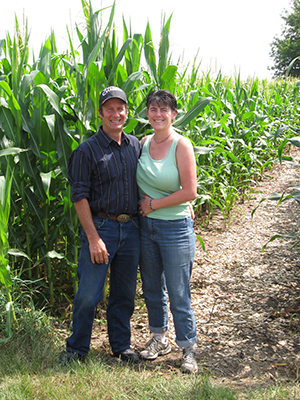
Along with his wife Leslie, David manages a remarkably diverse 150-acre farm, just east of Lake Winnebago in Chilton. Their farm consists of beef cattle, egg layers, bees, pumpkins, strawberry fields, row crops and grains.
The Meuers have always worked with the land rather than against it. The cattle are grass-fed and rotationally grazed on 30-ares of sloping pastures. Relying on the stream running through their land to provide water for their cows, they installed stream bank fencing to help hold the soil in place and keep the water clean as it empties into Lake Winnebago.
The natural springs in their pond are used in their drip irrigation for strawberries, reducing their water use by 40% and eliminating the need for a high-capacity well for overhead irrigation.
Recognizing the value in sharing space with wildlife, the Meuers converted one of their crop fields into a food plot for wildlife. David attributes the food plot as the reason why they lost no deer or turkey during a particularly frigid winter recently.
Tapping the sugar maples on their farm has resulted in a robust maple syrup business. They have also begun harvesting puffball and morel mushrooms, wild plums and black walnuts from trees planted by David over 30 years ago.
A unique aspect of their farm is their heavy emphasis on agri-tourism. More than 30,000 people from all over the country visit Meuer Farm each year to learn about farming and challenge their sense of direction in the corn maze. The Meuers also host farm-to-table dinners during the summer months and bring in local chefs to prepare meals featuring produce grown on the farm.
“If Aldo Leopold himself had ever met David or his father, I firmly believe he would have been impressed by their quiet, persistent passion and land ethic,” said Rock Anderson, retired Calumet County Conservationist.
 Sign In
Sign In
 Sign In
Sign In
